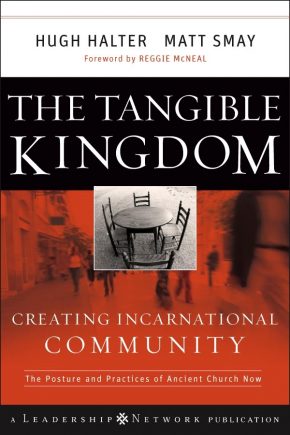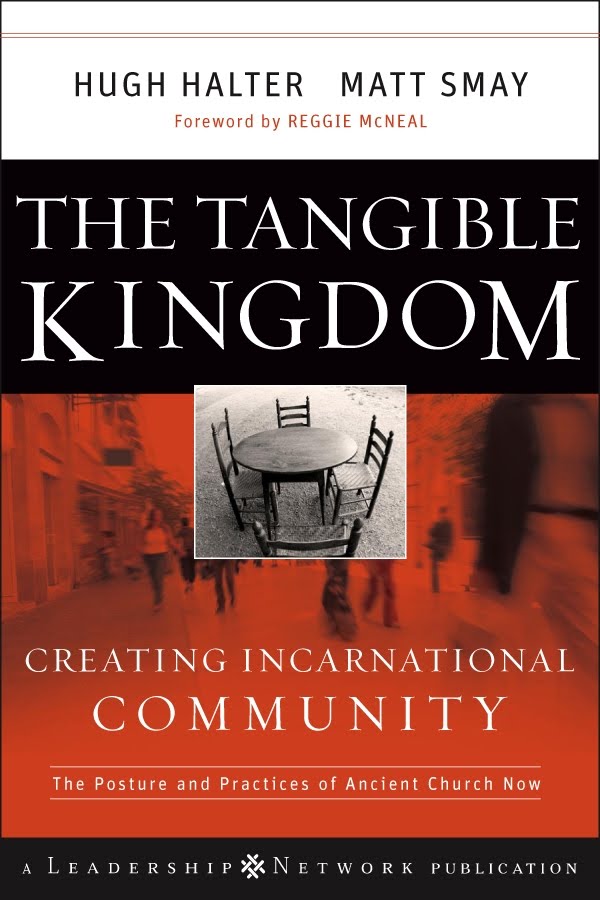 A few years back I read a book by Hugh Halter and Matt Smay, entitled The Tangible Kingdom. As I read it my heart burned. When I shut the book I said out loud: “That is what I want to do with my life.” And I have. At least I have tried. And I am doing my best to drag others along with me.
A few years back I read a book by Hugh Halter and Matt Smay, entitled The Tangible Kingdom. As I read it my heart burned. When I shut the book I said out loud: “That is what I want to do with my life.” And I have. At least I have tried. And I am doing my best to drag others along with me.
Halter writes that discipleship is “doing the kinds of things Jesus did, with the kinds of people he did them with.” That means hanging out with the hungry, the disenfranchised, the displaced. It means engaging deeply with my existing relational network – my hockey buddies, my neighbours and co-workers. It means leaving my comfort zone to pray for and with the spiritually disoriented; attempting to bring hope and healing in Jesus name; seeing the tangible goodness of God flow into every nook and cranny of the city. When Jesus and his disciples came to your town, that was good news, really good news. That should still be true. Where followers of Jesus go, good news should flow.
A New Vision for Discipleship
It is no secret how Jesus did discipleship – that is, how he developed his disciples. He shared his life with them and together they lived on mission. If we want to be a disciple of Jesus, if we want to develop disciples of Jesus today then it will happen as we do the same – share our lives and live on mission together. We can’t become a disciple on our own by reading and memorizing scripture indoors. We have to get out, serving others and building friendships.
One of our greatest challenges to becoming a true disciple of Christ is the unwritten, but well understood, Canadian social code.
The extreme version goes something like this: I get up in the morning, exit invisibly into my garage. Drive to work, make small talk at work, and come home from work. Press the garage door opener. Return to my cocoon. Don’t call me. Don’t ring my doorbell. Don’t bug me, unless you are friend or family; or I have won the lottery.
There is a terrible cost when we collectively live by this code. This code is safe but it renders us lonely, disconnected and cold. It turns our neighbourhoods into ghost towns. Sure, people have their country clubs, their hobbies and their churches. But these are all like little ghettos, sometimes-pretty little ghettos, but ghettos all the same. And this might be fine for the intended purposes of say a private club, but for a church it is unacceptable.
A New Vision for the Church
The church is the people of Jesus, who are becoming more and more like him. His greatest command was for people to love God and love their neighbour.
The code of Jesus for the church trumps the Canadian code. The code of Jesus forces us to ask some disturbing questions: What if one of my most important jobs as a follower of Jesus is to warm up my neighbourhood? What if Jesus really meant it when he told me to love my neighbour? What if this is a massive and missing part of my discipleship?
Since I first read The Tangible Kingdom a few years ago, I have discovered that nobody wants to be preached at, nobody wants canned answers, nobody wants to be solicited, and nobody wants to be evangelized. As Bruce Cockburn, Canadian artist, sings: “Wave a flag, wave a bible, wave your sex or your business degree, whatever you want but don’t wave that thing at me.”
Yet, almost everyone yearns for community, almost everyone wants to make positive difference, almost everyone wants to be befriended, and almost everyone is searching for answers to ultimate questions. I have discovered that if you hang around long enough and in a safe enough way the conversation always turns to God at some moment.
So I pray and I hang out and I expect the Spirit to stir something up. When my hockey buddies go out, I am there with them. When they go golfing, I grab my clubs. If they invite me camping, I pitch a tent.
I now regularly expect deep spiritual conversations with seekers. I seldom bring up the topic, but I am often invited into another’s search for God. I serve the poor and bring along seekers who are eager to serve with me. I do all this with faith filled friends who are doing the same.
The faith-filled friends that have joined me in this journey are more than just a fellowship group. We see ourselves as a missional community – living on mission together. We have adopted a monthly 3-step rhythm.
We meet once for study and prayer together. We meet again to offer generous hospitality – neighbourhood Christmas parties, curling, beach outings, Oktoberfest. And lastly, we meet to serve the poor together. At each of these gatherings we invite along friends, neighbours and co-workers depending on their interest and spiritual openness. We live the rhythm as individuals and we practice it as a group.
Extending Generous Hospitality
As a result, my life has never been so filled with spiritual conversations with un-churched or ex-churched. My heart has been changed as I have made friends with street people. Our neighbourhood is vibrant and social and our homes are warm places to invite in fellow church members, neighbours, co-workers, friends, and teammates.
Jesus tells us to love our neighbour. I think the best way to show that love and to make the Kingdom of God more tangible is by learning the names of our neighbors and sharing food and hospitality with them. Generous hospitality changes the DNA of our neighbourhoods, our places of work, and our relational networks.
So, I have made the Kingdom of God more tangible in my life and there is no going back. I invite you to do the same.
